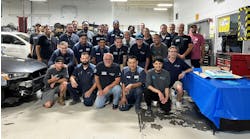When discussions began last year about the possibility of repealing the McCarran-Ferguson Act, I wasn't sure if I was for or against federal oversight of the insurance market. I've never been a believer in turning over control to big government, so having local and state entities oversee the insurance process seemed to be the right approach. And, apparently, I haven't been alone in my uncertainty. This month's cover story on the issue shows that others aren't sure if repealing the Act, which was first enacted in 1945, would be good or bad for the nation's collision repair centers. I'm starting to think more and more, however, that repealing the Act makes sense.
On a weekly basis we're getting complaints from shops who are outraged over insurer activities related to alleged steering, insufficient labor rates, direct repair programs, lowball estimating practices and more. Some of these complaints have turned into lawsuits, such as New York shop operator Greg Coccaro's well-publicized case against Progressive Insurance (see April's ABRN). Other suits are in development. Industry long-timers admit that the current conditions are as bad as they've ever seen in the market. In short, there is an uprising of mammoth proportions swelling from coast to coast among shop owners who are fed up with insurer antics.
The insurers hold most of the cards — since they control the money and give a thumb's up or thumb's down to DRP arrangements. They also have the financial wherewithal to lobby lawmakers for their own interests. Shops and their associations don't have that kind of cash. Something, however, has to happen to put pressure on insurers to act appropriately. Repeal of the McCarran-Ferguson Act may just be the action necessary to make a difference. And remember, we're not talking exclusively about insurance as it relates to collision repair. The change would impact all aspects of insurance, including medical and small business.
There's an old saying, "If it ain't broke, don't fix it." Can anyone honestly say the present system isn't broken? State oversight doesn't seem to be working; perhaps federal oversight will.
In our cover story this month there is concern that repealing the Act will create a tidal wave of antitrust lawsuits from shops against insurance companies. Attorney Trevor Hiestand with Harper, Waldon & Craig in Atlanta says such cases are extremely hard to prove since the courts have ruled that common insurer practices — such as preferred provider networks, sending customers to certain shops, and only paying for certain parts and procedures — are hard to prove. Hiestand adds that costs for insurers to defend such lawsuits would likely be passed down to consumers and shops.
It seems to me shops and consumers are already paying a high price for insurer control. Would paying higher premiums born from lawsuit expenses really be worse? The information gained from those lawsuits, and the mere potential for information to get out into the public, might be reason enough for insurers to settle such suits before trial. The same holds true for Mr. Coccaro's suit in New York, where Progressive has to be concerned about the discovery process that could uncover unflattering details about the firm's operation. Perhaps if McCarran-Ferguson is repealed, Progressive won't be the only insurer squirming about discovery.
And I'm quite certain plenty of shops would love to make insurers squirm, even if it's just a little bit.
Michael Willins


